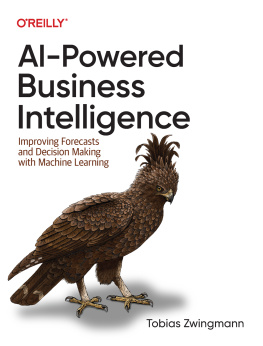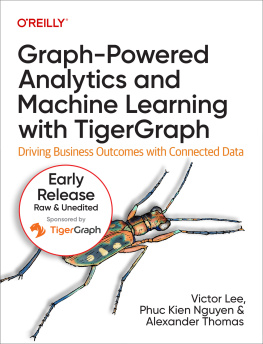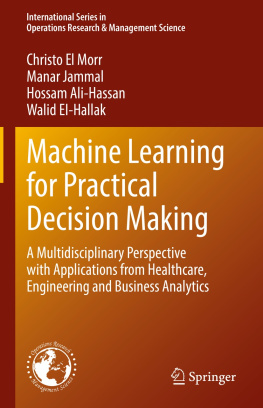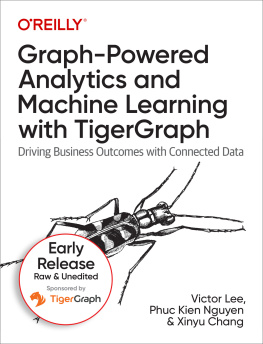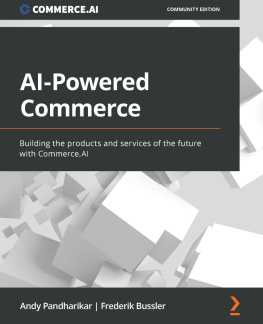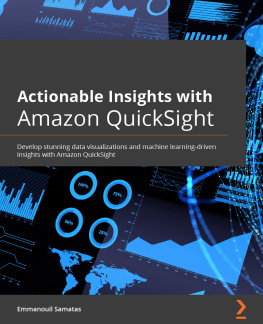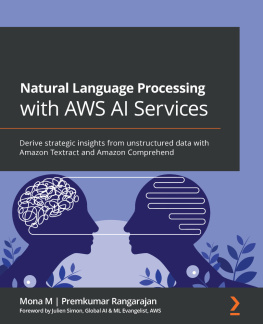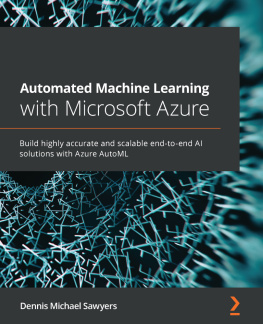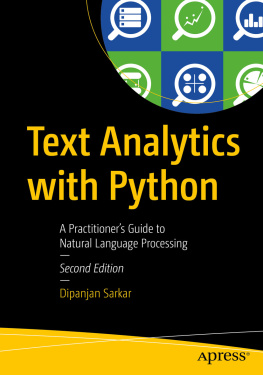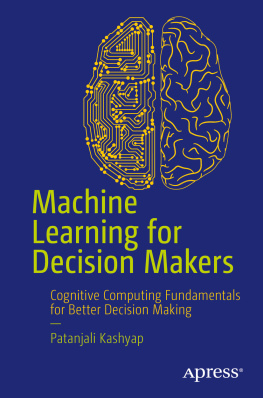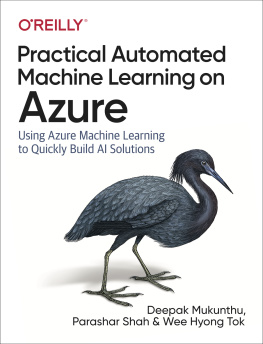Praise for AI-Powered Business Intelligence
After 15 years in the data world, this book has turned my view of classic BI upside down. AI-Powered Business Intelligence is excellently designed and structured. I wish I had a book like this much earlier .
Kai Aschenbach, Head of Financial BI-Tools, HDI Global SE
AI-Powered Business Intelligence is the definitive book for anyone who wants to understand what it takes to improve business intelligence with AI. From conceptualization to operationalization, Tobias has done a terrific job in creating a practical playbook that outlines a step-by-step approach to managing data-driven intelligent solutions for your business.
Ram Kumar, Chief Data and Analytics Officer, Cigna
Tobias writes at a level of technical sophistication that works very well for me, a non-technically trained person. There is a healthy amount of coding, but not too much, and it is all integrated effectively with related business principles.
George B. Moseley, Professor, Harvard T.H. Chan School of Public Health
AI-Powered Business Intelligence is one of the best books for anyone wanting to apply data science and machine learning concepts to the world of BI.
Himanshu Yadav, Head of Data, Commonwealth of Massachusetts
AI is a daunting discipline with many intricate pieces needing to come together. With AI-Powered Business Intelligence at your disposal, youll have the foundations to confidently build AI capabilities into your data analytics products.
Mathias Halkjr, Principal Architect, Data & AI, Fellowmind
AI-Powered Business Intelligence is one of the most logical books that I have come across in AI. If you are a data professional and trying to find that connection between AI and BI, Tobias Zwingmann has done the job. Highly recommend this book!
Ravit Jain, Data Evangelist, Founder & Host of The Ravit Show
The way Tobias described how AI and BI can be merged together is amazing! Recommended for all business analysts and BI professionals.
Joyjit Pal, Strategy Consultant, Deloitte
AI-Powered Business Intelligence
by Tobias Zwingmann
Copyright 2022 Tobias Zwingmann. All rights reserved.
Printed in the United States of America.
Published by OReilly Media, Inc. , 1005 Gravenstein Highway North, Sebastopol, CA 95472.
OReilly books may be purchased for educational, business, or sales promotional use. Online editions are also available for most titles (http://oreilly.com). For more information, contact our corporate/institutional sales department: 800-998-9938 or corporate@oreilly.com .
- Acquisitions Editor: Michelle Smith
- Development Editor: Rita Fernando
- Production Editor: Christopher Faucher
- Copyeditor: Sharon Wilkey
- Proofreader: Piper Editorial Consulting, LLC
- Indexer: Judith McConville
- Interior Designer: David Futato
- Cover Designer: Karen Montgomery
- Illustrator: Kate Dullea
Revision History for the First Edition
- 2022-06-10: First Release
See https://www.oreilly.com/catalog/errata.csp?isbn=0636920584834 for release details.
The OReilly logo is a registered trademark of OReilly Media, Inc. AI-Powered Business Intelligence, the cover image, and related trade dress are trademarks of OReilly Media, Inc.
The views expressed in this work are those of the author, and do not represent the publishers views. While the publisher and the author have used good faith efforts to ensure that the information and instructions contained in this work are accurate, the publisher and the author disclaim all responsibility for errors or omissions, including without limitation responsibility for damages resulting from the use of or reliance on this work. Use of the information and instructions contained in this work is at your own risk. If any code samples or other technology this work contains or describes is subject to open source licenses or the intellectual property rights of others, it is your responsibility to ensure that your use thereof complies with such licenses and/or rights.
978-1-098-11147-2
Preface
Pop culture has had a huge impact on the way we view AI. If theres anything that sci-fi movies such as The Matrix and The Terminator have taught us, its that AI is out to get us and that AI has a human touch. Arnold Schwarzeneggers Terminator showed us what an AI-turned-human could look like. From The Matrix, we learned that we might not even recognize that our lives are all controlled by a superior artificial intelligence.
While I think that both of these takeaways are problematic, I do believe they convey some truth in the context of business intelligence (BI). AI is coming to get us and it might have a human touch. But before we get into the details, lets first clarify some key terms. What is BI, exactly? BI is difficult to define because it depends on who you ask, when, and in what context.
The definition of BI for the context of this book, however, is fairly straightforward. I define BI from a systemic point of view: business intelligence is a system or software that enables business users and analysts to look at data from multiple sources within an organization with the goal of making better-informed decisions. So when I refer to BI, this term is closely related to BI systems such as Microsoft Power BI, Tableau, and Looker, and the underlying infrastructures that run these systems.
Lets take a quick look at AI, a term that we will explore in much broader detail in the course of this book. First, AI fuels all kinds of business processes today. More than 50% of all companies worldwide are on an AI journey, with at least some small use cases or early proof-of-concept (PoC) projects. The most popular AI use cases include the following:
If you look at the breadth of AI use cases, it would be naive to think that the impact of AI initiatives would skip the domain of BI. Its inevitable and only a matter of time that a proportion of traditional BI tasks such as planning and forecasting will be outperformed by AI. If you try to beat AI at finding patterns in data, good luck! Youll probably lose.
Second, when we think about AI, we often think about technology replacing our jobs. However, how realistic is this concern, really? Ask yourself, when do you expect an automated end-to-end AI system or robot to be good enough to take over 100% of your daily job? Five more years? Ten more years? Never? On the other hand, when do you think a colleague sitting next to you could use AI to outperform you on important tasks? Next year? Next month? Is that person already in the company? Its important to realize that AI itself is not replacing our jobs. Rather, people who know how to harness AI are entering organizations and changing the status quo. This is where data scientists come into the picture.
Shortly after the term
All of a sudden, traditional data professionals such as business analysts and BI professionals found themselves standing on the sidelines, while new data scientists were brought in to work on exciting AI use cases. This led to a disconnect between the two sides.

